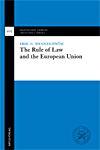 The internal EU conception of the rule of law is formulated by the European Court of Justice through the development of its case law. The enlargement conception of the rule of law has been formulated mainly by the European Commission, with the agreement of the Council, through the assessment mechanism it constructed in the mid-1990s, and a decade’s practice in applying it. The external relations conception of the rule of law has been formulated by the Commission, as regards co-operation, aid and trade, and by the Council and its Secretariat as regards other foreign policy measures. A comparison of how the EU applies the concept in these three different situations demonstrates great variations that reveal lack of consistency. The reasons for this unintentional proliferation are rooted in the growth of supranational power in the Community sphere, countered by the continuing strong influence of Member States in other policy areas. As EU legislation attaches consequences to the inconsistent application of the concept, the proliferation is a violation of the rule of law principle in itself. The internal EU conception of the rule of law is formulated by the European Court of Justice through the development of its case law. The enlargement conception of the rule of law has been formulated mainly by the European Commission, with the agreement of the Council, through the assessment mechanism it constructed in the mid-1990s, and a decade’s practice in applying it. The external relations conception of the rule of law has been formulated by the Commission, as regards co-operation, aid and trade, and by the Council and its Secretariat as regards other foreign policy measures. A comparison of how the EU applies the concept in these three different situations demonstrates great variations that reveal lack of consistency. The reasons for this unintentional proliferation are rooted in the growth of supranational power in the Community sphere, countered by the continuing strong influence of Member States in other policy areas. As EU legislation attaches consequences to the inconsistent application of the concept, the proliferation is a violation of the rule of law principle in itself.
The author, Erik O. Wennerström, LL.M., Director for International Affairs at the Police Division of the Swedish Ministry of Justice, is active at the University of Uppsala. He has a background with the European Commission and the Swedish Ministry for Foreign Affairs, and has been an adviser to countries seeking membership of the European Union on rule of law matters. |